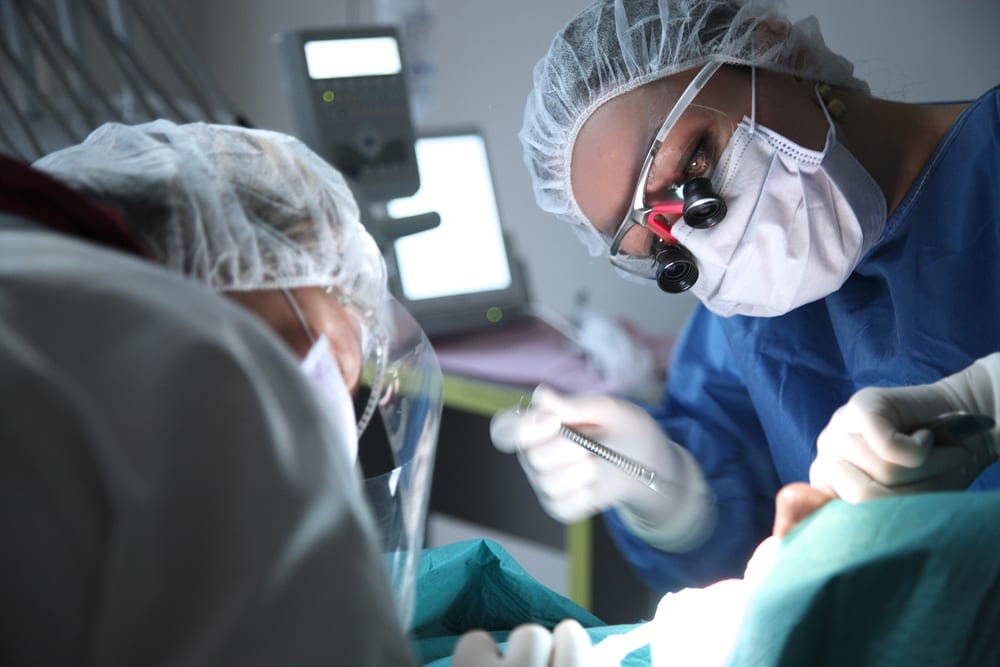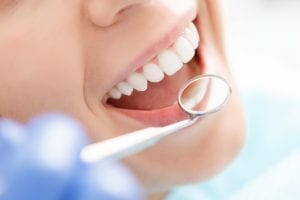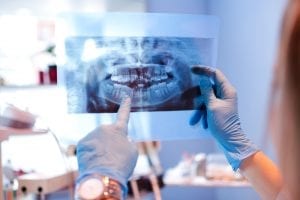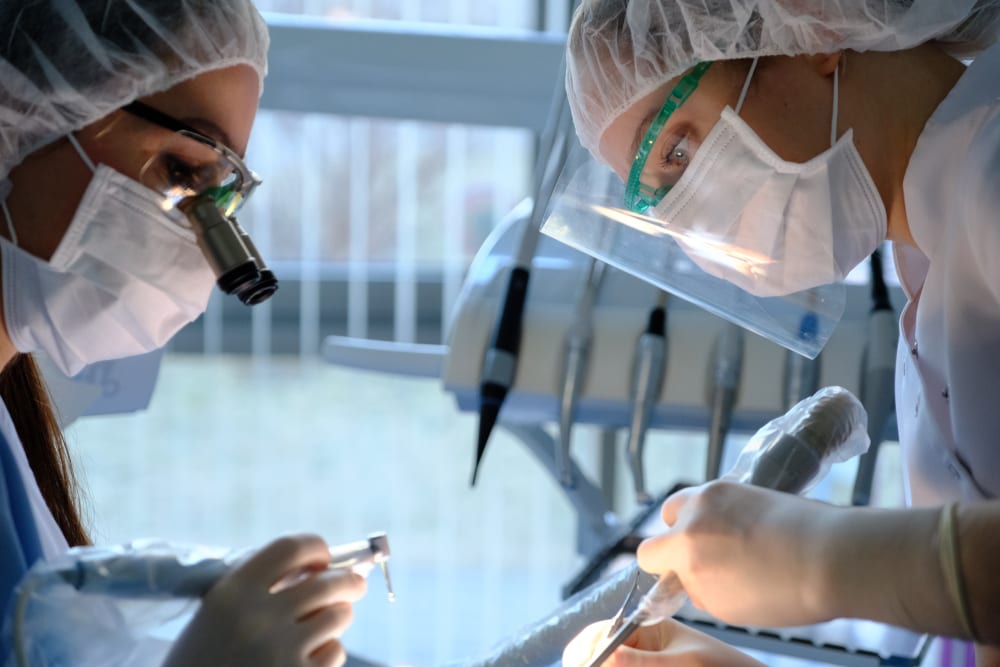Palisades Periodontics & Implants
Dr. Navid Nobaharestan offers periodontal & oral surgery treatment for the patients of The Palisades Dentists, and also for local referring dentists/external offices, such as dental implants, extractions, bone grafting, gum surgery, and much more.
Implants + 3D Imaging and Planning
Dental implants are now the standard of care to replace missing teeth. They are highly versatile and can be used to replace any number of missing teeth, from one to all.
As a replacement for one or multiple missing teeth, dental implants restore your smile, bite, and chewing function. A surgical screw-like fixture replaces your missing tooth root, and after some healing time, a crown is secured on top to replace your tooth. The planning process is as important as the surgery itself, so we rely on 3-dimensional imaging (cone beam computed tomography, or CBCT) and planning to ensure accurate placement of the dental implant. An implant that is in a better position, has a better chance of proper healing and successful long term results.

Extractions
While saving a damaged tooth is a high priority, there are some cases in which this is not possible. In these instances, your best option is to have the affected tooth extracted and then replaced.
For some people, the wisdom teeth simply emerge just like their other 28 adult teeth. The only issue they cause is minor discomfort that goes away once the teeth are through the tissue. For many people, however, the wisdom teeth are a major source of pain and suffering. This pain is due to the wisdom teeth being impacted. Impacted teeth are those that do not properly erupt through the gums. While any tooth can become impacted, the wisdom teeth are the most likely to face this issue. Impacted wisdom teeth can cause several problems:
- Overcrowding. Many times, wisdom teeth become impacted because there simply is not enough room in the jaw to house them. They still attempt to come through. As they do, they begin to push the rest of your adult teeth out of their natural alignment, causing overcrowding. Overcrowding can alter your bite and your smile.
- Cysts. A cyst is a fluid-filled sac that can form as a result of tooth impaction. Untreated cysts do not disappear on their own. Instead, they continue to grow and can cause serious damage to your jawbone.
- Damage to adjacent teeth. Sometimes, wisdom teeth do not erupt because they are growing sideways. When this happens, they can grow into the adjacent teeth. As they grow, they put more and more pressure on the teeth, which can eventually lead to cracks and other serious damage below the gum line.
- Pericoronitis. Sometimes, a wisdom tooth is only able to partially erupt through the gum tissue. A partially erupted tooth is difficult to keep clean. Because of this, you are likely to face a localized infection known as pericoronitis.
"If loving my dentist's practice is wrong, I don't want to be right. Not only do they offer the latest procedures using sophisticated technology, they bring to bear kindness and ethical conduct."
Bone Grafting & L-PRF
For implant placements, extractions, gum surgery/rejuvenation, and any other periodontal & oral surgery, we use patients’ own stem cells to aid in their healing. L-PRF, which stands for “leukocyte and platelet-rich fibrin,” is used to optimize wound healing and facilitate a smoother, more comfortable process. The procedure is simple– a sample of the patient’s blood is taken, and then we use the unique IntraSpin System to separate and concentrate cells and active proteins. When we place this L-PRF in his patients’ surgery sites, it releases the patient’s own natural healing proteins, accelerating healing.
Periodontal/Gum Surgery
When your gums recede, you are faced with a variety of issues, including a diminished appearance, looking older, an increased risk for tooth decay, tooth sensitivity, and even tooth loss. A gum graft is a procedure designed to restore support for your teeth, effectively giving you back your oral health, esthetics, smile, and your quality of life. There are a variety of different techniques that are used– no single technique suits every patient. A thorough periodontal consultation will determine which technique will give you the best results.
- Connective Tissue Grafting
- Free Gingival Grafting
- Tunneling Grafting (technique aka “pinhole”)
- Esthetic Crown Lengthening
- Gingival Depigmentation (aka ‘gum bleaching’)
- Osseous Surgery





"The office is beautiful."



Frequently Asked Questions About periodontal & oral surgery
Is periodontal & oral surgery painful?
Dentistry, specifically periodontal & oral surgery, has been given the reputation of being extremely painful and uncomfortable. Fortunately, new technology has made it so periodontal & oral surgery can be relatively painless. During your surgery, you may be given an anesthetic to numb the area and ensure that you will not feel any pain. For more serious and complex procedures, you may be put under general anesthesia or IV sedation to be asleep throughout the surgery. Prescription pain medication can be taken to eliminate any discomfort or pain after the surgery. If you are concerned about pain, please let your surgeon know so that they can address any concerns.
What can I do to ease my anxiety before my periodontal & oral surgery?
Dental fear and anxiety are common in both children and adults. Bringing someone you trust with you to the appointment, picking a stress-free appointment time, practicing relaxation techniques, and listening to music can help ease your anxiety. At The Palisades Dentists, we understand that you may be nervous about your procedure. It is important to speak up about your fears so that we can address them individually and ensure that you are comfortable.
I am not in pain, do I still need to have my wisdom teeth removed?
You may still need your wisdom teeth removed even if you are not in pain. If there is not enough room in your mouth for these teeth to come in, they can damage and crowd your other teeth. Wisdom teeth can also be difficult to reach while brushing and be more prone to decay.
I am missing a tooth in the back of my mouth, do I need to have it replaced?
Many people believe that because the missing tooth is not visible, it does not need to be replaced. However, missing teeth can cause damage to the mouth and jaw when not replaced. A missing tooth can cause bone loss or cause the surrounding teeth to be more prone to decay. Dental implants can help prevent bone loss and improve your overall oral health.
What will recovery after wisdom tooth extraction be like?
Immediately following your wisdom tooth extraction, you will be swollen and in some pain. You should take the prescribed pain medication as needed for as long as you are in pain. It is important not to drink from a straw for two weeks after your surgery. Soft foods, such as mashed potatoes and smoothies, will be your best option while you are healing. Be sure to take it easy and avoid any rigorous activity, as this can prolong your recovery process. Most patients feel back to normal after a week or so.
What should I avoid doing before undergoing periodontal & oral surgery?
You should not drink or eat anything for eight hours before undergoing general anesthesia or IV sedation. You should also not drink alcohol or smoke the day before surgery. We also ask that you brush your teeth before your appointment. This will help remove bacteria from the mouth.
Can I drive home after having periodontal & oral surgery?
If you require general anesthesia or IV sedation, you will need to be driven home from the appointment by a responsible adult. After surgery, you will feel groggy, and it will be unsafe to operate a vehicle.
